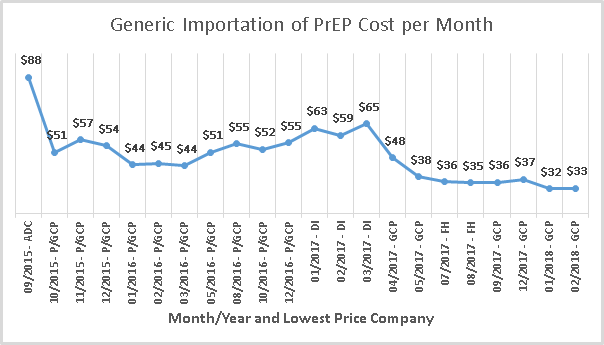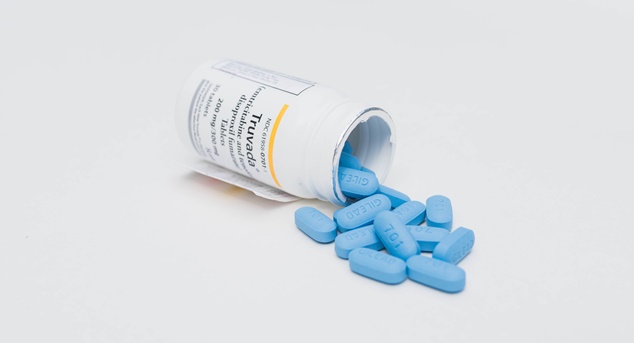Thank you to Chris Williams from PrEP’d for Change for keeping and providing a price watch, and for allowing me to use his data for this article.

ADC = All Day Chemist
P/GCP = PAN & Green Cross Pharmacy (Partnership)
GCP = Green Cross Pharmacy
FH = Freedom Health

The announcement on the 9th of February, 2018, that the Pharmaceutical Benefits Advisory Committee (PBAC) recommended Truvada, along with some generic equivalents, to be put onto the Pharmaceutical Benefits Scheme (PBS) as PrEP, is an exciting move. It is expected that PrEP should be available on the PBS by approximately mid-2018, meaning that PrEP can be purchased from Australian pharmacies for $39.50/month, or $6.40/month with concession. Various jurisdictions around the world have increasingly committed to funding increased access to PrEP, and a decline in HIV transmissions has been met in many of these places.
While this has been an important announcement, there has been a shortage of attention paid to past and present community activism around the personal importation of PrEP, which has accounted for a large proportion of PrEP uptake. Furthermore, personal importation of PrEP will continue to be a more affordable option than PBS (currently as cheap as $32-33/month) for individuals without concession (although anyone with concession is also eligible for Green Cross Pharmacy’s free PrEP coupons).
In upholding that PBS listing is a ‘game changer’ in access to PrEP, top-down approaches to ending HIV ignore and actively silence the existing grassroots efforts to access PrEP. For example, the Guardian reported the news with a title of “Subsidy for HIV prevention drug PrEP to slash cost from $10,000 a year to $474”, obfuscating the fact that no one pays $10,000 a year for Truvada in Australia. Since May 2017, the average cost of personal importation has been slightly less than what the PBS cost is set to be for non-concession persons, which is estimated to be approximately $474/year (or approximately $38/month).
Unfortunately, there has been a fairly constant emphasis on study trials and PBS-listing as markers that legitimate access to PrEP, and only the volunteer-driven PrEP Access Now and PrEP’d for Change have consistently promoted the bottom-up approach of personal importation in holistic and effective ways, with almost no funding. Although both Victorian based, activists in these groups have been powerful promoters of PrEP across Australia. As a Perth boy working to promote PrEP in WA, the work of PAN and PrEP’d for Change have been the most useful, adaptable, and potent resources for the promotion of PrEP. This has been especially useful in places that have not had access to study trials until more recently, or like the Northern Territory, still do not have any access. NSW, Queensland, and Victoria had expansive access to study trials in 2016 (where the average cost of personal importation ranged between $44 to $55/month), while South Australia, the ACT, Tasmania, and Western Australia gained access throughout 2017 (when the price had already seriously declined). It should be noted that the study trials have specific criteria, and may not be a viable option for people who do not want to be part of a study, or who would prefer to utilise PrEP via event-based dosing, rather than daily-dosing. Regardless, they have been a great access point for many more people to get onto PrEP.
Personal importation of PrEP has been an easy process, although from an outsider perspective, perhaps seems intimidating or murky. The TGA Guidelines easily explain the legality of the process, and individuals usually have appropriate testing for HIV, kidney function, and STIs with their doctor to receive their script (finding doctors who know much about PrEP is, and will continue to be an ongoing struggle). However, some of the personal importation options do not require a script (and therefore possibly not testing or regular monitoring), although the cheapest, GCP, does. PAN has had a collaborative and enduring relationship with Green Cross Pharmacy (GCP) in Swaziland, who have not only provided the cheapest PrEP throughout most of the period, but have also provided free coupons for low-income individuals. Admittedly, this has not always been perfect. The fluctuations in price are partly to do with shifts in exchange rates of different currencies, which can always be an ongoing risk. Furthermore, GCP temporarily disappeared as a direct provider of PrEP in early 2017, which allegedly left Dynamix International to capitalise on the market, involving disputes between two former and opposing co-PAN founders. However, GCP took the reins by April 2017 and has been globally lowering the price of generic PrEP since, forcing other online pharmacies to price match, as evidenced in the graph. The second half of 2017 has seen the lowest importation prices remain consistently under $36/month, from GCP. Rodney Ellis, a former PAN founding member, and Noel Offer, from GCP, seem to be responsible for this global drop.
Amidst the celebration of PBAC recommending PrEP on the PBS, a tricky set of political and economic questions arise. If personal importation of PrEP is so cheap already, why is PBS-listing necessary? As a hard leftist, I dislike parts of the rhetoric surrounding the evocation of the abstract ‘taxpayer’ for many issues, especially healthcare, which I believe should be universally free. However, I cannot help but wonder if it is worthwhile for the Federal Government to be paying such enormous amounts of money to pharmaceutical companies in order to subsidise a drug that all of us can easily personally import for much cheaper than the PBS co-payment. A friend working in the international generic PrEP market tells me that one generic PrEP pill costs 39c per pill to manufacture, including distribution. Disjunctions and disputes between nation-states, pharmaceutical companies, and activists have been, and will continue to be an ongoing point of contestation in the HIV/AIDS epidemic. However, just as ACT UP was unable to promulgate universal healthcare in the U.S.A., but did give treatment access to people living with HIV/AIDS, it is unfair to expect the same radical reshaping of Australia’s reliance on pharmaceutical companies in a neoliberal globalised world just from PrEPtivism, and in this way, PBS-listing is surely a victory in the overall goal of ending HIV.
The best benefit of PBS listing in my mind is not the cost, but that PrEP will become better legitimised in Australia, for both GPs and for consumers. The personal importing process, while exceptional, is certainly met with scepticism by many, and doctors are much less likely to pay attention to medications not listed on the PBS. This will certainly drive more people to access PrEP. As access to PrEP becomes expanded, I hope to see the work of groups like PAN and PrEP’d for Change better celebrated and documented, along with acknowledging the efforts of ‘early adopters’ of PrEP. Early PrEPtivists have fought hard against unfair stereotyping, have contributed to re-shaping the more productive notion of ‘safe sex’ we have today, and have undoubtedly already prevented numerous transmissions of HIV. To this I say, bottoms up!
For a great overview of facts about the PBS, and current information on personal importing, see http://pan.org.au/pbs/
Anthony K J Smith
Support OUTinPerth
Thanks for reading OUTinPerth. We can only create LGBTIQA+ focused media with your help.
If you can help support our work, please consider assisting us through a one-off contribution to our GoFundMe campaign, or a regular contribution through our Patreon appeal.




